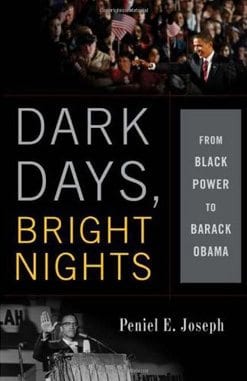
While many Americans credit President Barack Obama’s stunning electoral success to the victories of the civil rights movement, Tufts professor Peniel Joseph offers another view.
Instead of the civil rights movement, Joseph traces Obama’s legacy to the Black Power Movement in his new book, “Dark Days, Bright Nights: From Black Power to Barack Obama.”
Joseph calls Black Power “the most misunderstood social movement of the postwar era” that has been “demonized” and “stereotyped” since its origins in the 1950s. But despite this, Joseph contends that Black Power has “permanently altered the contours of American identity, citizenship, and democracy.”
In contrast to the civil rights movement, which worked from the “outside-in” to influence legal changes, according to Joseph, Black Power instilled “the race consciousness and pride within African American communities upon which much of contemporary black identity is based.” Black Power, therefore, created the cultural and political space from which Obama would eventually emerge.
It is upon this premise that “Dark Days, Bright Nights” explores the history of black leadership and politics over the past 60 years, detailing the lives of figures like Malcolm X, Stokely Carmichael, Amiri Baraka, Jesse Jackson and Barack Obama.
But for the historian, black politics are not limited to academics. A native New Yorker and the son of Haitian immigrants, Joseph’s personal involvement in politics began early in life. His mother, a unionized hospital worker, took Joseph to his first picket line at the age of 8, and from there he became active in local politics, the anti-apartheid campaign, and the issues of Haitian refugees.
Joseph took this interest in social activism to Stony Brook University in New York, and later to Temple University in Philadelphia, where he received his Ph.D. As a graduate student, Joseph wrote his doctoral dissertation on black radicalism and social movements.
He then completed his first book, “Waiting ‘Til the Midnight Hour: A Narrative History of Black Power in America.” But after Obama’s inauguration, Joseph said he wanted to write a book that would focus on the first African American president.
In his latest book, Joseph asserts that Obama is not a contemporary manifestation of Black Power — far from it. Black Power advocates would have “disagreed ideologically” with President Obama on many issues, Joseph explained in an interview with the Banner, but they “transformed politics to make room for” his electoral success.
For instance, Black Power articulated strong Third World solidarity, connecting the problems of blacks at home with the problems of people of color across the world. But the president, as well as other black elected officials, Joseph said, shows “allegiance to the ideology of American exceptionalism,” and supports institutions like the International Monetary Fund and the World Bank that are notoriously injurious to people of color.
Putting “black faces in higher places” doesn’t necessarily lead to progressive policies, he explained.
While President Obama may not espouse the views of Black Power radicals, on the spectrum of American electoral politics, his actions have been unmistakably progressive, according to Joseph. Obama passed more progressive legislation in the past 20 months than had been in the past several decades — “that’s an empirical fact,” he said.
But “the interesting part of Obama,” he continued, is how people have interpreted his actions so differently — while the Tea Party movement has decried the president for being too liberal, many progressives say he hasn’t gone far enough. Although Obama has passed the biggest re-distributive legislation since 1965, Joseph said, “his base wanted the biggest since the New Deal.”
In his book, Joseph also discusses the difficulties of an Obama presidency to African Americans. “Obama’s presidency presents the black community with very real challenges, ones that, his critics correctly point out, necessitates more vigilance — not less,” he says.
Although African Americans have “a lot of pride” in Obama, he explained in the interview, “absolutely they should criticize him.”
“Some criticism is gratuitous,” he qualified, but “the worst thing they could do” is to refrain from substantive criticism of the president. For example, mass incarceration, Joseph said, is a “crisis” for African Americans, and Obama “doesn’t want to address it” — but blacks need to hold him accountable.
Although some have called Obama’s election the end of black politics, Joseph insists it is just another stage in its long evolution. As for the direction of black politics in a post-Obama age, and whether the Obama model can be replicated, Joseph said, “We still have to see.” All he is certain of is that America’s search for racial and economic justice remains “unfinished . . . even as Obama’s historic election offers bittersweet hope for a more just future.”


![Banner [Virtual] Art Gallery](https://baystatebanner.com/wp-content/uploads/2024/04/Cagen-Luse_Men-at-store-e1713991226112-150x150.jpg)



